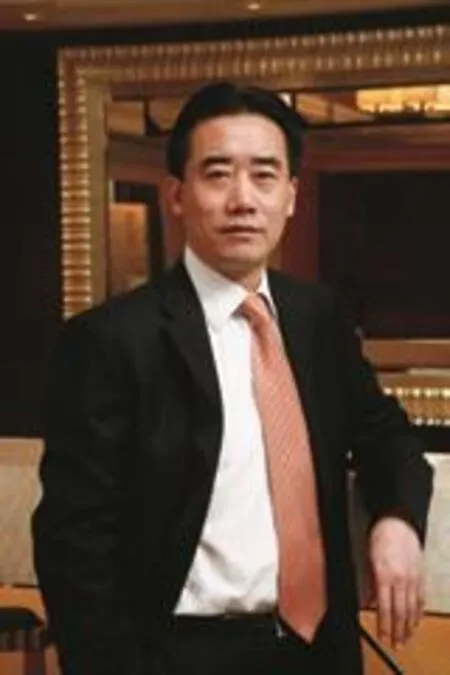Local Professionals for Local Market
Local Professionals for Local Market

Wen Xiaojie
In the past three decades, the Chinese hotel industry has developed at a rapid pace, with the number of hotels—especially high star hotels—growing fast. In Beijing alone, there are nearly 60 fve-star hotels. With the development of the hotel industry, China has also begun to see the number of local hotel professionals, including senior managers, increase. Wen Xiaojie, Deputy General Manager and Owner’s Representative of Sofitel Wanda Beijing, is among the most outstanding senior hotel managers.
In 1980, hundreds of students were enrolled in the Beijing Tourism School. They were trained for the establishment of Hotel Kunlun, the frst fve-star hotel designed and built by the Chinese. Wen was among one of the students. In the following two years, he took courses including catering service, English, tourism services, among others. After that, he was sent to the Beijing Foreign Studies University to continue his education in English. In 1985, Wen joined Hotel Kunlun as a tutor of new trainees.
After Hotel Kunlun’s trial operation was initiated in 1986, Wen started his career in the hotel industry with the position of bar manager. Getting an opportunity in 1989 from an international exchange program between China and Finland, Wen studied tourism management for one and a half years in Finland.
The experience in Finland was an eyeopener to Wen. “At that time, our hotel mainly served foreigners. In Finland, I earned foreigners’ living habits and way of thinking, but in China, we can only conjecture about how foreigners are living and what they are thinking,”Wen told Beijing Review.
When returning to China in 1991, Wen transferred to sales, a job that would have him directly catering to customers’ needs and develop connections with various people. “As a salesperson, your words and deeds concern the image of your hotel and you must try to make your clients trust you and then choose your hotel,” Wen said.
The sense of mission helps his career, Wen said. To improve himself, Wen went to Helsinki School of Economics in 1996, taking fve courses related to his sales job.
Participating in an internal inspection group of Jinjiang International Hotel Management Co. Ltd. (Hotel Kunlun is a member of the company) also allows Wen to experience a feeling of accomplishment. “Before that I didn’t know what I should do, but through finding faults with others, I know what and how I should do things,” he said.
In 2007, Wen left Hotel Kunlun and was appointed by Dalian Wanda Group Corp. Ltd. as Deputy General Manager of Sofitel Wanda Beijing, the new flagship Sofitel in the Asia-Pacific region. From management team to owner’s representative, the change of roles concerned Wen.
While on the management team, Wen felt the owner was comfortable, because the management team would report all things to the top boss. Being an owner’s representative was different—Wen found that the reality is far from his assumptions. Although he is not the general manager, nor a member of the management team, he is the frst one to be asked by his boss. “You need to give space to the management team to work, but also reach the goal of your boss, which can be quite strenuous,” Wen said.
He said foreign hotel management groups have good brands, but the professionals sent by them may not have as good an understanding of the Beijing market as Chinese professionals do. What Wen has to do is to guide them to understand Beijing, and understand the boss. “My job is to make the boss earn money and make the foreign party improve their brand,” he said.
Working together with foreign hotel managers, Wen sees the strengths of both foreign hotel management groups and local Chinese professionals. In his eyes, the Chinese should learn from foreigners about their unremitting efforts in promoting brand image and their concerns for details, while foreign hotel management groups should come to develop a better understanding of the Chinese market.
Wen’s next focus is to improve the capability of the hotel in receiving Chinese guests in the Chinese language. According to him, from 1995 to 1998, the number of Chinese guests began to increase in the hotel industry in Beijing as Chinese economic development accelerated. Wen’s former employer, Hotel Kunlun, knows how to receive Chinese guests, but many foreign hotel management groups still don’t know how to cater to the Chinese market.
“I hope the foreign team can know how to sell rooms in the low season, especially during the annual sessions of the National People’s Congress and the National Committee of the Chinese People’s Political Consultative Conference, because many people around the deputies and members will come to Beijing together, which is a big source of guests,” Wen said.
As for the World Expo to be held in Shanghai this year, Wen also has big expectations. “About 80 percent of visitors to the World Expo will also come to Beijing and, differing from the 2008 Olympic Games, the World Expo will bring continual visitors because it will last six months,” Wen said.

